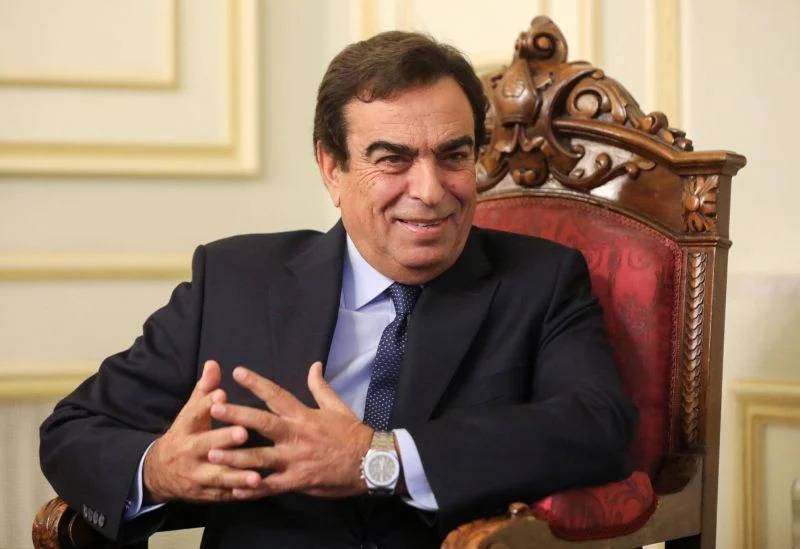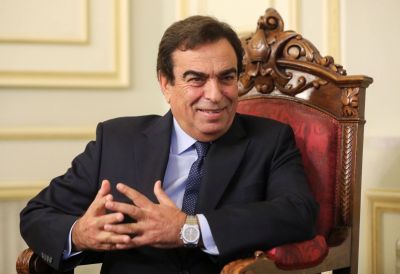
Information Minister George Kurdahi has become a hero for some and a traitor for others. (Credit: Mohamed Azakir/Reuters)
One might expect the minister to present a withdrawn face, an embarrassed gesture and a more moderate tone. There is indeed something to feel uncomfortable about, when one stirs a diplomatic crisis with major repercussions for the country that one is supposed to represent.
But if he is ill at ease, George Kurdahi has not given the impression of being so in the last few days. He has worn a broad smile on his face during the various meetings aimed at finding a way out of the crisis, in particular with the Maronite Patriarch Bechara al-Rai. He, who can now boast about having a giant photo of himself hanging in the streets of Sanaa, the Iran-backed Houthi-held Yemeni capital, seems to be gloating after once again entering the spotlight.
Saudi Arabia announced a series of punitive measures against Lebanon last Friday. Although the Saudi officials acknowledge that the escalation goes well beyond this matter, it comes after Al Jazeera aired an interview conducted with Kurdahi before he joined the government, in which he criticized the kingdom’s intervention against the Houthis in Yemen.
This episode made the troublemaker a central pawn in Lebanese political life, with some calling for his resignation, and others, mainly Hezbollah, insisting that he must stay. On Thursday, Prime Minister Najib Mikati urged Kurdahi to “examine his conscience” and take into consideration the best interests of Lebanon and its citizens who live and work in Gulf states; however, he stopped short of explicitly asking the information minister to step down.
“My resignation from the government is out of the question,” the minister said following his meeting with the patriarch, as if it was his call.
Even his political patron, Marada Movement leader Sleiman Frangieh, does not seem to have any leeway in this matter, as the minister’s fate is entirely in Hezbollah’s hands. L’Orient-Le Jour contacted George Kurdahi and the Marada Movement, but they both declined to comment.
‘Nobody dares talk about him in the team anymore’
In any case, the former TV star keeps adding fuel to the fire by refusing to apologize to Saudi Arabia. As if, for him, this matter is far beyond politics. After voicing support for the Syrian regime in 2011, he was fired from the Saudi channel MBC, which he joined in 2000 and where he had his heyday as the host of the Arabic version of “Who Wants To Be A Millionaire?”
“The revolution is a conspiracy designed to undermine Syria’s security,” he said at the time.
“He was fired while he was in the middle of the shooting, following his remarks supporting Bashar al-Assad,” a Lebanese producer who worked with him a few years ago recalls.
“He was very affected at the time because he was famous. I believe that he was convinced of what he said about the Syrian revolution, and of his recent remarks about Yemen,” the producer, who declined to be named, says.
For her part, a journalist close to the Saudi channel revealed that “the MBC management expressly requested its employees this week not to discuss the Kurdahi matter or his career with the channel.”
“Nobody dares to talk about him in the team anymore. The management somehow bans it, although they had reconciled four years ago,” the same journalist who asked for anonymity, says.
Kurdahi embarked on his journalistic career in the 1970s with the state-owned TV channel Télé Liban as a news anchor, correspondent, reporter and editor. He remained at the channel until 1978. Then he moved to radio. From 1979 to 1992, he worked at Radio Monte Carlo in Paris, then at Radio Orient, before being hired by MBC FM radio in London in 1994.
Following his hasty departure from MBC in 2011, he joined the Lebanese channel LBCI for a short period. He then went to Egypt where he hosted several shows.
“He was polite, but nothing more. A little bit arrogant, but he was popular on the air. He is a very paternalistic and traditional man,” another producer who worked with him says.
‘He can go and live in Syria’
In a few days, the journalist has become a hero for some and traitor for others.
“Of course, I support George Kurdahi in this whole thing, like everyone in the southern suburbs of Beirut,” Itaf, a Hezbollah supporter who lives in Haret Hreik, says.
“He is a patriot, [and] he supports Bashar al-Assad,” she adds.
Mohammad, 55, also a resident of the Haret Hreik neighborhood and a Hezbollah supporter, has the same opinion.
“We’ve always loved him, ever since he’s been on TV,” he says. “We love him all the more after all this story. He is fair and honest.”
In Tariq al-Jadideh, a pro-Hariri Sunni neighborhood of Beirut, on the other hand, criticism is sharp.
“He can go and live in Syria and Yemen since his allegiance is not to Lebanon,” Ali, a resident of the neighborhood, says. “He’s got us in a lot of trouble … and insulted the only country that can help us,” he adds.
Samer, standing next to Ali, says, “We had managed to restore relations with the Arab world, and now he is engulfing us again in an endless tunnel.”
This article was originally published in French in L'Orient-Le Jour. Translation by Joelle El Khoury.
